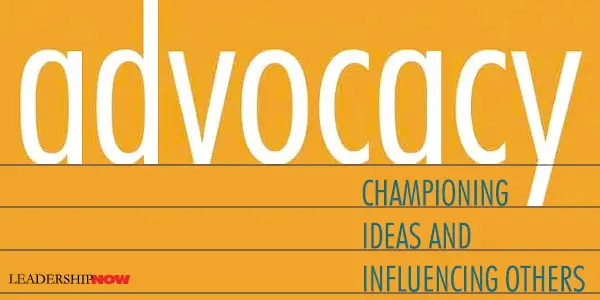 |
 |
09.14.11

Advocacy: How to Champion Ideas and Influence Others
EVEN a great idea can be stopped. An idea is like play. It needs a good producer and a good promoter, even if it’s a masterpiece. Otherwise, the play may never open; or it may open but, for lack of an audience, close after a week.All ideas need to be sold; up, down, and across. You have to become an advocate. “Advocacy,” says John Daly, “is an exhausting but necessary skill.” Tom Peters recently tweeted: “Remember, all of implementation is politics, like it or not—and you damn well better learn to like it.” Daly defines advocacy as “persuading people who matter to care about your issue. It’s about getting listened to, being at the table when decisions are made, being heard by people who make decisions. It’s about facing and overcoming resistance. It is about speaking and writing in compelling ways that make decision makers want to adopt your ideas.” Advocacy by John Daly, is a comprehensive handbook on influence. He covers the complex factors involved in selling an idea, supported by examples and current research in the fields of persuasion, power relations, and behavior change. Here are some of the ideas he shares: Communicate Your Idea With Impact: Decide what you want to communicate before you ever start talking. Restate key aspects in alternative ways. Don’t get defensive or humiliate those who ask questions. Alan Greenspan’s advice: “Make every member of Congress look like a genius for asking a particular question, even when the question is truly idiotic.” Frame Your Message: Successful advocates communicate their ideas in ways that fit decision-makers’ schemas. When pitching proposals, wise proponents seek agreement on the problem before discussing possible solutions. Encourage people to buy into the problem the way you want it defined. Build Your Reputation, Create a Brand: Regardless of how good your idea is, if it doesn’t fit your brand name, people aren’t likely to buy it. Form Alliances: Understand people’s basic needs—inclusion, control, efficacy, and affection. People want to matter. Let others feel indispensable to the success of the idea. Be proud of what you tout; how you talk and act about your idea shapes how others respond. Your Idea Is Only as Good as Its Story: Influential narratives are short, fresh, easily understood, and engaging, and they arouse curiosity. If you can’t craft a good story around your idea, interesting and relevant factoids are the next best thing. Network!: It’s not who you know that matters, it’s who knows you. Put yourself in the place of most potential. Befriend those without friends. Lyndon Johnson: “Remember, your opponent today may well have to be your ally tomorrow. Never burn personal bridges.” Timing Is Everything: The answer to “why now?” is your persuasive case. Problems have four features—magnitude, predictability, complexity, and affected parties. Address these. Random—not regular or cyclical—problems get the decision maker’s immediate attention. Make the Idea Matter: Inexperienced advocates often spend too much time trying to sell the features of their ideas before pitching their benefits. Demonstrate Confidence: Shorter words are remembered better than longer ones. Avoid hedges, disclaimers, disfluencies, and tag questions. Even the most experienced advocate will be able to refine their skills and increase their influence by incorporating the advice found in this handbook. 
Posted by Michael McKinney at 09:07 AM
|
BUILD YOUR KNOWLEDGE
 

How to Do Your Start-Up Right STRAIGHT TALK FOR START-UPS 
Grow Your Leadership Skills NEW AND UPCOMING LEADERSHIP BOOKS 
Leadership Minute BITE-SIZE CONCEPTS YOU CAN CHEW ON 
Classic Leadership Books BOOKS TO READ BEFORE YOU LEAD |